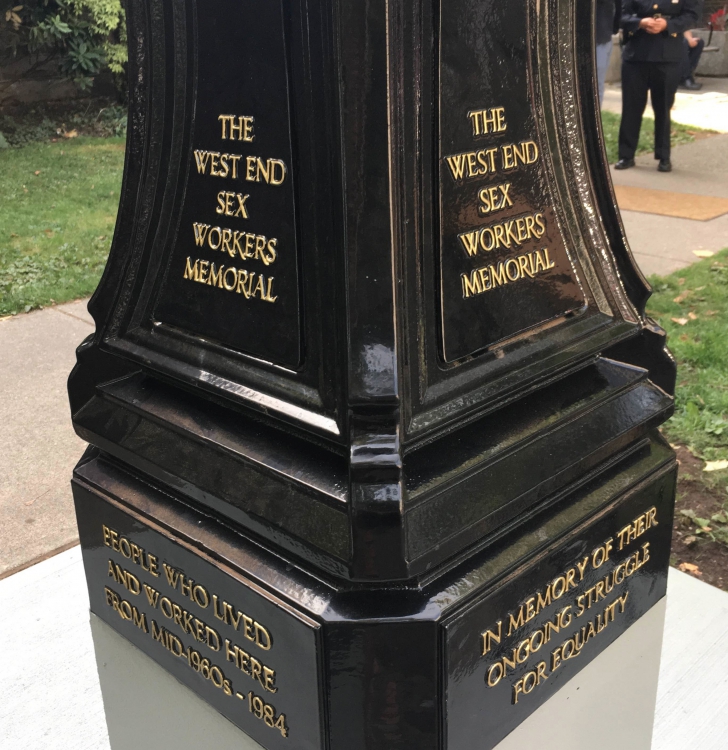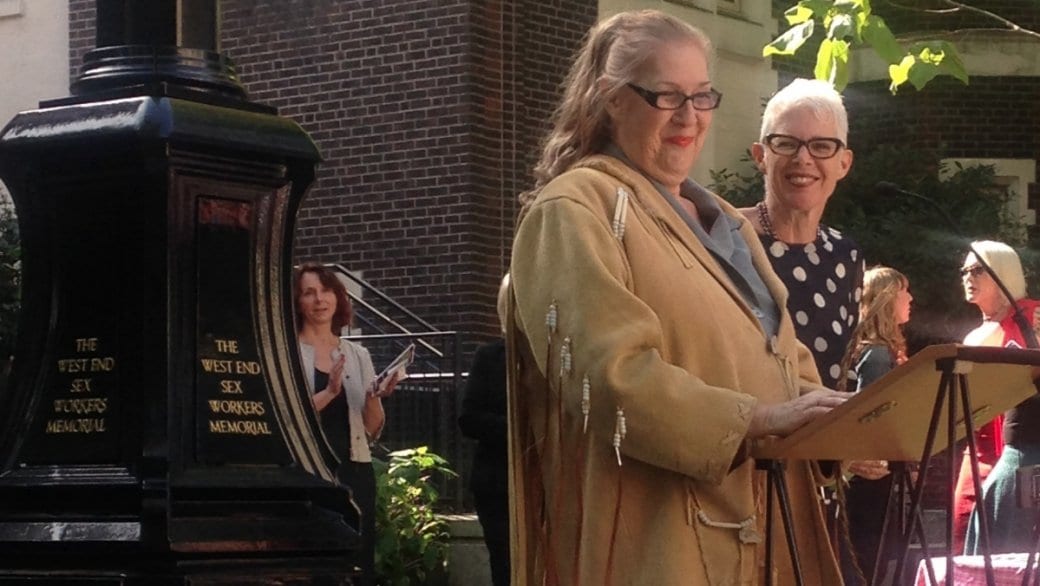In his recent attempt to revise the history of sex workers in Vancouver’s West End, Kevin Dale McKeown makes several statements that we consider misleading. We are writing to challenge his mocking tone and rancorous effort to re-scapegoat on-street sex workers who were violently prohibited from living, loving, and working in the West End in July 1984.
In discrediting our own research and organizing as “self-serving,” McKeown erases the West Sex Workers Memorial Committee and our eight-year campaign to secure financial reparations and a formal civic apology from the City of Vancouver. He instead claims that his recollections are more truthful and authentic than the voices of sex workers who, like Jamie Lee, have survived to demand justice and reconciliation.
In McKeown’s distorted revision of West End history, expelled sex workers become the villains. However, our archival research found close to 1,000 news articles revealing that power elites in the early 1980s — including Mayor Mike Harcourt, MP Pat Carney, Attorney General Brian Smith, Concerned Residents of the West End (CROWE) and Shame the Johns — forged a “war on hookers” with lethal consequences.
Our research also proves that the City of Vancouver’s traffic department spent thousands of dollars to “deter prostitution-related traffic” in the West End.
Residents like McKeown moved into the West End when it was a thriving entertainment zone. Many Davie Street businesses operated 24 hours a day. In a three-block area, there were four nightclubs and a 24-hour gambling club at Thurlow and Davie. There was the Boom Boom Room/Buddy’s, After Dark (now Celebrities), Parkside Tropicana (now Numbers), and Myrt’s Club (now Little Sister’s bookstore).
Ten restaurants along the Davie strip also operated all day and night, in addition to a 24-hour per day grocery store, three 24-hour gas stations, and a 24-hour Shoppers Drug Mart.
For close to 20 years, on-street sex work was part and parcel of the pulse, noise and bustle of this mixed commercial/residential district.
By uncritically referencing the “zoo” of the West End twice, McKeown reduces sex workers to the status of captured animals stripped of dignity and autonomy. At the same time he frantically disavows his own and other white gay men’s complicity in hooker-bashing tactics.
Recycling the same illogical reasoning as CROWE’s vigilantes 35 years ago, McKeown makes a failed attempt to hide his investment in a “quiet” and “peaceful” gaybourhood cleansed of “noisy” hookers.
Let’s name McKeown’s revisionist history for what it is: the second coming of CROWE 2.0.
McKeown asserts, without corroborated evidence, that sex workers on Davie Street had turf wars and rudely dismissed requests to tone it down. Our interviews with former hookers on Davie Street, John Lowman’s research, and the 1984 film Hookers on Davie tell a different story.

They show a tight-knit group of cis-women, trans women, and hustlers who worked pimp free, often in pairs. Many helped seniors with their groceries. During work shifts, they checked in with coworkers at the Columbia Inn. They fundraised for queer and trans groups through their elaborate drag court system, the Dogwood Monarchist Society. They patronized local businesses and banks. And as members of the Alliance for the Safety of Prostitutes, they organized against vicious whorephobia.
In Hookers on Davie, the late Chrissy Warren is shown at her apartment window taking down license-plate numbers and watching out for her colleagues on the corner of Pendrell and Bute streets.
Conflict in the ’hood arose as a direct result of ugly, vigilante actions led by CROWE, including leader Gordon Price, and Shame the Hookers (aka Shame the Johns).
Night after night, placard-carrying moral mobsters targeted sex workers. They hurled hurtful insults, threw beer bottles, and practiced routine intimidation to rob sex workers of their worth, their dignity, and their humanity.
Crusaders fought to protect their white, seaside enclave from plunging property values and what they considered a de facto red light district.
While sex workers built the foundation for the queer Davie Village, they have never been recognized as the West End’s first champions for the rights of sexual, gender, and racial minorities.
At the unveiling of our West End Sex Workers Memorial on Sept 16, 2016, Superintendent Michelle Davey offered an official apology from the Vancouver Police Department for their disrespect towards sex workers over many decades. Davey affirmed the VPD’s radical shift to placing sex workers’ safety and security atop their agenda.
Philip Owen, the city’s longest-serving mayor, stressed his support for sex workers’ rights and the need to press for “equality for everyone.” City councilor Andrea Reimer declared, “Harm is a soft word for the abductions, torture, and murders of hundreds of sex workers.” Jessica Schaap, rector of St Paul’s Anglican Church reminded us: “Jesus kept the company of sex workers.”
Memories shared by McKeown’s “extremely imposed upon” residents will never help us understand how tragedies were spawned by the expulsion of sex workers from the West End in July 1984.
Criminologist John Lowman has meticulously mapped the sequence of displacements that occurred in the 10 years after BC Chief Justice Allan McEachern’s final solution pushed prostitute-citizens out of the West End.
Sex workers’ harm reduction and risk assessment strategies, their efforts to build community, earn steady income and nurture kinship bonds, were ruptured post-eviction. Forcibly relocated east to poorly lit industrial zones, 65 sex workers, disproportionately indigenous, were brutally murdered on a Port Coquitlam farm — cut up and fed to pigs.
Our majestic West End memorial at Pendrell and Jervis Street is a reminder that these human tragedies were preventable.
Every life is worthy and has value. For eight years we pressured Vancouver Mayor Gregor Robertson and city staff to agree: historical wrongs and injustices must be redressed with urgency and conviction.
Chrissy Warren and all the other hookers on Davie deserve at least that much. Rather than listen to the sour and irrelevant braying of old, white, neo-liberal queers like McKeown, let’s work to end the criminalization and stigmatization of brave, unrepentant hos and hustlers — the queerest of all queers.
Jamie Lee Hamilton is an indigenous trans sex worker, who co-founded the West End Sex Workers Memorial Committee in 2008 with Becki Ross, who is a professor of sociology at the University of British Columbia.
Editor‘s note, Nov 7, 2016: This article was amended to show the correct spelling of the Boom Boom Room/Buddy’s.

 Why you can trust Xtra
Why you can trust Xtra


